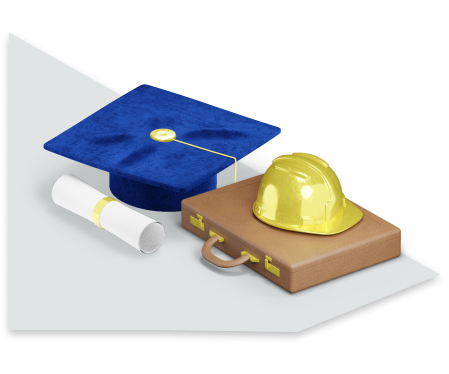Am I eligible for Express Entry?
To be eligible for Express Entry, candidates must meet the criteria of at least one of the following federal economic immigration programs:
Federal Skilled Worker Program: The FSWP is Canada’s primary economic immigration pathway. The minimum requirements include at least one year of continuous full-time or equivalent paid work experience in the past 10 years in a skilled occupation under the National Occupational Classification (NOC) skill level 0, A, or B; validated intermediate or better language ability in English or French; for candidates educated outside of Canada, an educational credential (certificate, diploma, or degree) and an Educational Credential Assessment (ECA) report. In addition to meeting the FSWP's minimum work, language ability, and education requirements, candidates must also obtain at least 67 points under its points grid.
Canadian Experience Class: The CEC provides international students and foreign workers who have Canadian experience with the opportunity to obtain permanent residence. Candidates must have obtained at least one year of skilled, professional, or technical work experience in Canada within 3 years of the application date and also meet language proficiency criteria.
Federal Skilled Trades Program: The FSTP is available to candidates who want to become permanent residents on the basis of qualifying for a skilled trade. Eligibility criteria include having a minimum of 2 years of full-time work experience in a skilled trade within the 5-year period of submitting an application; meet the job requirements of the skilled trade; have a full-time job offer in Canada for a period of at least 1 year or possess a certificate of qualification in the skilled trade that has been provided by an official Canadian authority; and meet language proficiency criteria.
What Canadian immigration options do I have?
Canada offers over 100 different immigration streams for skilled workers who want to obtain a Canadian permanent resident visa. You can pursue one or more of these options at the same time:
Express Entry: Canada welcomes most of its skilled worker immigrants through Express Entry.
Provincial Nominee Program (PNP): It is the second major way that Canada welcomes skilled workers.
Quebec: The province of Quebec operates its own immigration system to recruit skilled workers.
Other Federal Immigration Programs: In addition to its Express Entry programs, IRCC offers other skilled worker immigration pathways. Options include moving to Canada's Atlantic provinces, rural and northern communities, working as a caregiver, working in the agri-food sector, starting a business or being a self-employed person.
Pursue a Study Pathway: Studying in Canada is a major stepping stone towards obtaining a permanent resident visa through the above immigration options.
Work in Canada: If you already have a job offer in Canada, you can begin your immigration journey by moving to Canada on a work permit and then pursuing the above options to transition to immigration status.
Should I enter the Express Entry pool if I have a low CRS?
Entering the Express Entry pool if you are eligible is beneficial for you since it increases your chances of successfully immigrating to Canada:
First, it is free to enter the Express Entry pool. You incur some costs before entering the pool for your language test and ECA, but these are costs you will need to incur for the majority of Canadian immigration programs you wish to apply to.
Express Entry CRS cut-off scores are always fluctuating and are impossible to predict. What may seem like a low CRS score could be enough to eventually secure an invitation to apply for permanent residence.
While you are in the Express Entry pool, you can work on improving your CRS score such as by retaking your language test, gaining more eligible professional work experience and/or education, or working and studying in Canada.
While in the pool you may obtain an invitation to apply for a provincial nomination which will essentially guarantee you will receive an invitation to apply (ITA) for a Canadian permanent resident visa.
You may also receive a Canada job offer while in the pool which may give you a high enough CRS score to obtain an ITA for permanent residence. You can apply directly to other Canadian immigration programs while you are in the Express Entry pool.
Is my language test CLB level good enough for Express Entry?
There are two components to answer this question. The first component is identifying whether your CLB level is enough to make you eligible for an Express Entry program. The second component is identifying whether your CLB level is enough to make your CRS score competitive.
First, you need to ensure your CLB level meets the requirements of one of the three Express Entry programs:
Federal Skilled Worker Program: You need at least a CLB 7 for reading, writing, speaking, and listening in one of the official languages to be eligible under the Federal Skilled Worker Program.
Canadian Experience Class: You need at least a CLB 7 across all four language abilities under the Canadian Experience Class (CEC) if you have a NOC skill type of 0 or A. You need at least a CLB 5 across all four language abilities under the CEC if you have a NOC B skill type.
Federal Skilled Trades Program: You need a minimum CLB 5 for speaking and listening and at least CLB 4 for reading and writing.
Secondly, you want to ensure that you get the highest possible CLB level on your language exam. If you are a single Express Entry candidate, for example, a total of 310 CRS points will be available to you if you take official language tests in both English and French. Even if you only take a test in one language (e.g., English), you need to consider how much weight IRCC places on your language test score in the Comprehensive Ranking System.
What makes a job offer valid under Express Entry?
IRCC states that a valid job offer under Express Entry generally meets the following criteria:
- is full-time and not a seasonal job
- is at least one year
- is a skilled job that falls under skill type 0, A, or B in the National Occupational Classification (NOC)
- be recent (e.g., within the last 1 year)
- not be from an embassy, consulate, or high commission
Job offers must be written and outline the likes of your duties, pay, and conditions of employment (e.g., which hours you will work.
Job offers often need to be supported by a Labour Market Impact Assessment (LMIA) but there are jobs that are exempt from the LMIA requirement. If an LMIA is required, your employer must apply for one by submitting an application to Employment and Social Development Canada/Service Canada.
Valid job offers under Express Entry are worth either 50 or 200 additional CRS points. Valid job offers under NOC skill type 0, A, or B are awarded 50 additional CRS points. Job offers under NOC skill type 00 are eligible for 200 additional CRS points.
Which Express Entry job offers are exempt from requiring an LMIA?
An LMIA is not required for an Express Entry job offer to be valid if all three of these conditions are met:
- you have continued to work full-time for the employer on your work permit for at least 1 year (or you have worked for the employer part time for an equivalent length of time as 1 year)
- the job offer fulfills other requirements for it to be valid such as it falling under NOC 0, A, or B skill type, being recent (e.g., within the last 1 year), and not being from a diplomatic mission in Canada
- you have a work permit that is exempt from an LMIA under an international agreement such as CUSMA (formerly known as NAFTA), federal-provincial agreement, or the "Canadian interests" category. Examples of "Canadian interests" exemptions are available here.
If you are working in the skilled trades you can receive job offers from up to 2 employers and you must work for both of them.
I am already working in Canada. Does this count as a job offer?
No. A work permit is not a job offer. A job offer is valid under Express Entry if, among other eligibility criteria, your employer has provided you with a written full-time job offer for one year or more if you receive permanent residence approval and your employer obtains an LMIA if one is required or the job offer falls under an LMIA-exemption.
What are the required documents for an Express Entry profile?
When submitting your Express Entry profile, IRCC will ask you for information from the following documents:
- your passport or travel document
- language test results
- proof of Canadian education or your educational credential assessment (ECA) report
- proof of funds
- provincial nomination (if you have one)
- written job offer from an employer in Canada (if you have one)
Will IRCC keep my profile after one year?
No. Your profile expires after one year. If you wish to remain in the Express Entry pool, you need to wait for your profile to expire, and then submit a new one on IRCC's website. IRCC suggests that you take screenshots of your expired profile to make it easy for you to re-submit your information.
Can I combine my language test scores for Express Entry?
No. Your language test will evaluate you across four abilities: reading, writing, listening, and speaking. It may be possible that you achieve a different score for the same ability after taking a test multiple times.
Unfortunately, you can only submit your language test results from one test. Fortunately, you can submit your best language test result. Note that your language test score is valid for two years. One approach you can pursue is entering the Express Entry pool, retake the language test until you get your desired score, and then update your Express Entry profile to increase your CRS score.
How can I obtain an ECA for Express Entry?
You need to obtain your Educational Credential Assessment (ECA) from a body that is designated by IRCC.
Your options are:
- World Education Services
- Comparative Education Service – University of Toronto School of Continuing Studies
- International Credential Assessment Service of Canada
- International Qualifications Assessment Service
- International Credential Evaluation Service
- Medical Council of Canada (professional body for Doctors)
- Pharmacy Examining Board of Canada (professional body for Pharmacists)
Do I need to include my proof of settlement funds in my Express Entry profile?
Yes. You will need to include in your Express Entry profile the amount of money you will have available to help you settle in Canada to demonstrate that you will be able to financially support yourself and any family members who immigrate with you.
You will only be required to meet the proof of settlement funds criteria if you receive an invitation to apply for permanent residence under the Federal Skilled Worker Program or Federal Skilled Trades Program unless you are legally authorized to work in Canada and have a valid job offer from an employer in Canada. Those who receive a permanent residence invitation under the Canadian Experience Class do not need to meet proof of settlement funds criteria.
If you are eligible for more than one program, you are unable to choose which program IRCC will issue your invitation under.
I was previously ineligible but now I am eligible for Express Entry. What should I do?
You will need to create a new profile and submit it on IRCC's website again since ineligible profiles are no longer valid and cannot be changed.
What do I need to do if I get an ITA for permanent residence?
You will need to provide IRCC with requested documents and pay any necessary fees. Examples of requested documents include:
- Valid passport
- Birth certificate
- Language test results
- Educational Credential Assessment (ECA)
- Police clearance certificates
- Medicals







